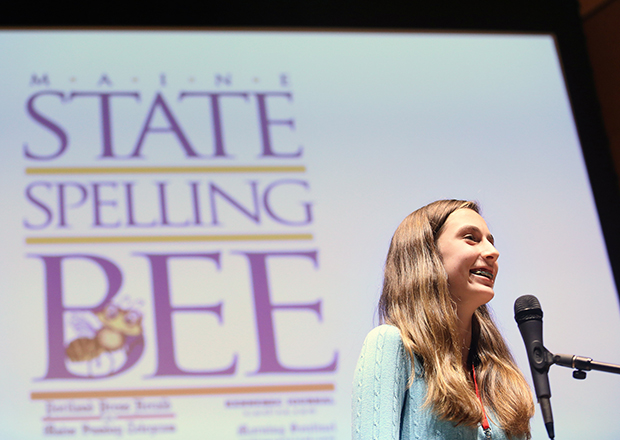It started with “hamster” and ended with “neurotogenic.”
Inside a hushed lecture hall at the University of Southern Maine in Portland, 14 middle school students from around the state competed in the Maine State Spelling Bee on Saturday in what was the longest competition in recent memory.
Lucy Tumavicus, representing Cumberland County, won in the 94th round of competition by correctly spelling “neurotogenic,” a medical term relating to the inducement of neurosis. Her penultimate word was “mesalliance,” a word of French origin that refers to a marriage with a person of a lower or unsuitable class or stature.
“I did not expect this,” Tumavicus, an eighth-grader at Lincoln Middle School in Portland, said after her victory. She congratulated the runner-up, Brandon Aponte of Brooklin. Aponte, an eighth-grader who attends the Downeast Homeschool Co-op, represented Hancock County.
Tumavicus moves on to represent Maine in the Scripps National Spelling Bee May 27-29 in National Harbor, Md.
The nerve-wracking statewide competition took five hours. Sitting in folding metal chairs, the spellers wore over-size name tags signifying that they were still in the competition.
The group of nervous middle school students was whittled down slowly until only Tumavicus, 14, and Aponte, 13, the reigning state champion, remained.
Then in a verbal war of attrition, they went head to head, word for word.
They spelled “keest,” and “springerle,” “trattoria” and “basmati.” They blew through “sassafras,” “chassis,” and “capricious.” With ease they sounded out “hartebeest” and “tokamak” and dozens more.
Then, after round 76 (“schadenfreude” and “keeshond”) the ante was upped once again. The bee’s organizers, after finally exhausting the list of 300 words they prepared for the competition, went into uncharted – and polysyllabic – territory by using an auxiliary list.
What the competitors did not know was that head judge Michael Ashmore started with the hardest words once the spellers completed the first group of 300.
A string of wrong answers then plagued Tumavicus and Aponte, who alternately missed “rantil,” “gallinato,” “quagga” and others. They whiffed on “borgesian,” “congelifract” and ironically, “sesquipedalian,” which refers to the use of long words.
When both final spellers miss their respective words, the competition continues. The winner must spell a word correctly following a misspelling by an opponent, and then must spell a second word correctly.
The misspellings continued for multiple rounds, until the spellers edged slowly back into familiar territory.
“This is the longest (bee) in five years, by 20-something rounds,” Ashmore said.
There is no study guide for the auxiliary list – save, perhaps, for the dictionary, Tumavicus said.
To prepare, she said she studied word origins and roots, looking at each group of terms grouped by their language of origin.
After the competition, Aponte said that although he expected to win, his consolation is freedom from the hours of preparation needed to compete.
“I’d been here so many times, this is my third year,” said Aponte. “It’s a lot of work studying, and I’m kind of tired of words.”
The bee was sponsored by MaineToday Media, publishers of the Maine Sunday Telegram/Portland Press Herald, the Kennebec Journal and the Morning Sentinel.
Matt Byrne can be contacted at 791-6303, or at:
Twitter: MattByrnePPH
Copy the Story LinkSend questions/comments to the editors.




Success. Please wait for the page to reload. If the page does not reload within 5 seconds, please refresh the page.
Enter your email and password to access comments.
Hi, to comment on stories you must . This profile is in addition to your subscription and website login.
Already have a commenting profile? .
Invalid username/password.
Please check your email to confirm and complete your registration.
Only subscribers are eligible to post comments. Please subscribe or login first for digital access. Here’s why.
Use the form below to reset your password. When you've submitted your account email, we will send an email with a reset code.